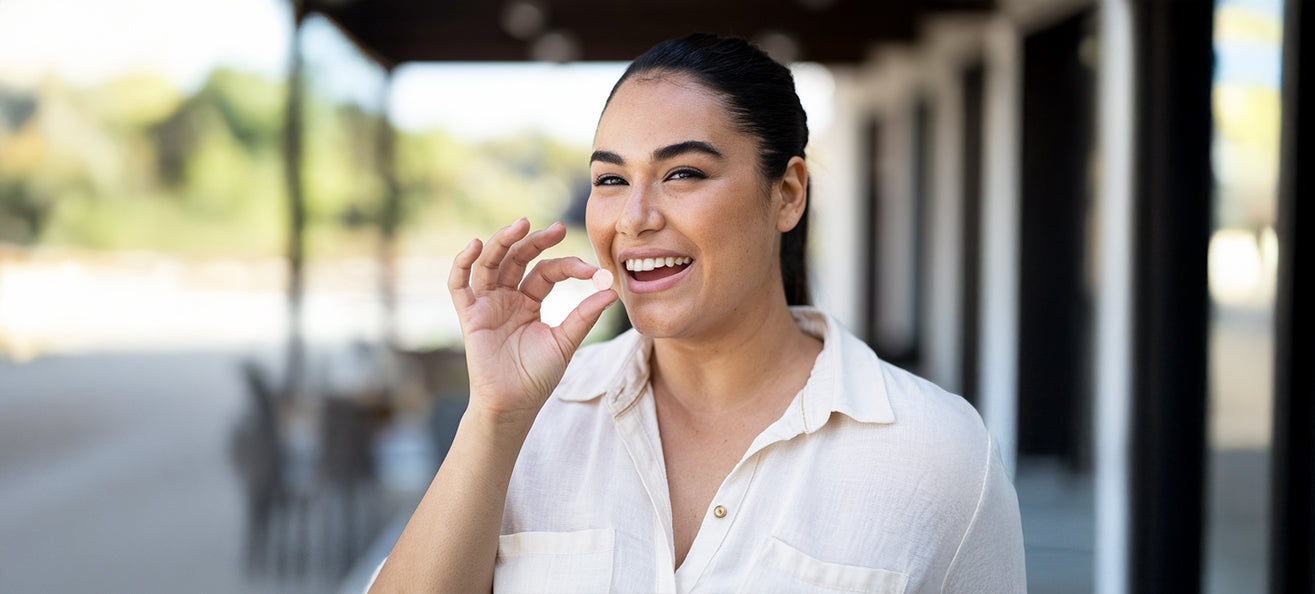Article By: Whittany Gibson, RDN
Co-Author: Gianna Soussan (Instagram @vsgianna_)
For some, weight loss surgery can be life-changing, drastically reducing their health risks and improving their quality of life. For others, it can have unintended consequences — in this case, transfer addiction. Transfer addiction is a term that describes substituting one addictive behavior for another.
For Gianna, this meant transitioning from a food addiction before WLS to an alcohol addiction starting as soon as three months post-op. While there are still many unknowns surrounding this condition, one sure thing is that it has real and lasting effects on an individual's physical and mental health — something Gianna knows all too well as she recently recounted her story about overcoming transfer addiction after WLS. Read on to hear her story.
W: What was your surgery date, and what WLS procedure did you have?
G: I had a Vertical Sleeve Gastrectomy on September 2, 2020.
W: What led you to the decision to have WLS?
G: After a lifetime of obesity and tireless failed attempts at getting it under control, years of trying different weight loss programs, yo-yo dieting, hiring a nutritionist, following various exercise programs (the list goes on), I decided that I needed a more helpful and statistically proven tool to help me lead the healthy lifestyle that I desperately desired. With obesity running in my family and seeing the long-term negative effects it can have on its victims, I decided to go through weight loss surgery at the young age of 25 to mitigate the long-term risks of obesity. I started by researching the different weight loss surgery options available to me. Next, I scheduled a consult with a highly accredited bariatric surgical team local to me in Sarasota, FL.
W: Describe your relationship with food throughout childhood and early adulthood before WLS.
G: My relationship with food was something that I struggled with from a very young age. As mentioned, I come from a large Italian family in which obesity is prevalent — so I lacked the education and lifestyle that healthy living required. When I was young, I was often served more food than I could eat but was forced to finish what was on my plate before I could leave the table. Over time, this led me to completely lose sight of my hunger and fullness cues early in life. This generated unhealthy eating habits, an inability to control my appetite and portions, and a toxic relationship with food.
As I got older and recognized that I took up more space than other kids my age, I quickly became aware of my body as “fat” and struggled to accept myself. The cycle of body shaming began in about 3rd grade, and the bullying from family and peers only contributed further to my toxic relationship with food. In 8th grade, I developed a binge eating disorder, which began the cycle of my most toxic eating behaviors. I continued to gain more and more weight as I got older and would cycle through different attempts at changing my lifestyle for the better — only to fail and “relapse” even worse than before. It was extremely discouraging and damaging, not only to my physical health but, most of all, to my mental health.
W: Had you ever heard of transfer addiction before experiencing it yourself?
G: Transfer addiction was mentioned to me among the other risks and complications of bariatric surgery, but this wasn’t something I took as seriously as I should have at the time. I thought, “I’m a super mindful, self-aware, and strong-willed person... I’ll be fine! But I quickly learned that this line of thinking was very naïve of me.
W: When did you first realize you had a problem with alcohol, and had you ever had any issues with alcohol before surgery that you were aware of?
G: Alcohol had never been an issue for me before surgery. It was simply a social activity to partake in with friends, just like many other young adults. As I began rapidly losing weight, I ended a long-term relationship, felt a new sense of confidence and a refreshed identity, and, as a result, started going out regularly and making new friends in the bar scene. Weekends out at the bars turned into weeknights. Weeknights at the bar became too expensive as my tolerance went up, and that led me to start having friends at my apartment to binge drink without a hefty bar tab. Noise complaints led me to begin limiting the group of people that would join me, and eventually, as time went on, I’d find myself drinking alone. Drinking alone led to drinking earlier and earlier in the day. Then, before I knew it (in a matter of a six-month progression) I was requiring a shot of liquor to get out of bed in the morning to mitigate my severe withdrawal symptoms. This was absolutely terrifying. And it was then that I realized I was in trouble and needed to get professional help.
W: How did you get help?
G: I admitted myself to a voluntary rehab after I physically could not stop drinking on my own. I was aware of the dangers (seizures, organ failure, etc.) that could result from self-withdrawal, and after trying and failing to quit on my own, I decided to go into a 30-day rehab program.
W: After talking with others, have you met anyone who has gone through the same experience?
G: Once I realized that I could not get my binge drinking under control on my own, I admitted myself to a voluntary rehab. In that rehab (not specific to WLS), I met FIVE other bariatric patients going through the same thing — both women and men on both ends of the age spectrum. This was the start of my recognizing the true scope of transfer addiction in the bariatric community, and I was shocked that more light wasn’t shed on this issue. I was determined to make it my calling to make others aware from that day forward so that they didn’t have to suffer the same naivety and consequences that I did as a result of my lack of education and vulnerability post-op.
W: What do you do now to help take care of yourself and prevent unhealthy relationships with food or substances?
G: Stopping drinking was only the first behavioral step in getting myself closer to the healthier post-op/post-weight loss version of myself that I had so desperately wanted to become. I quickly learned that I would need to acquire a lot of other hard-earned tools in my coping toolbox in order to move forward successfully. Outside of following an Alcoholics Anonymous program to get back on my feet after my experience with transfer addiction, I also attended cognitive behavioral therapy weekly (and still do, 2 years later) to work through my traumas, negative coping mechanisms, and overall toxic relationship with food to get to the root cause of what led me to become obese and unhealthy in the first place.
It is SUPER important that bariatric patients enroll and continue to seek one-on-one therapy before, during, and after surgery to ensure that they learn to cope with life in a healthier way. For me, healthy coping mechanisms include exercising, journaling, reading, yoga/meditating, music, napping, cleaning, cooking, and communicating with my loved ones for support in times of distress. These new, healthy coping mechanisms and behaviors definitely took time and effort to develop and actively turn to, but over time, they have become the norm for me and, essentially, my saving grace.
W: Who do you feel is at risk for transfer addiction?
G: Being that unhealthy relationships with food and inadequate coping mechanisms are common in the bariatric community, this makes us prime candidates for the risk of falling victim to transfer addiction. Obese individuals tend to turn to food for emotional support (usually in the form of binge eating), and when that ability to eat for comfort is taken away, other things can easily replace that attempt at filling an unresolved void — alcohol, drugs, sex, gambling, shopping, etc. With that being said, it is apparent that bariatric patients, at large, are at a high (if not the most) risk for transfer addiction as we simply do not have the ability to relapse back to comforting binge eating habits, particularly in the beginning when our restriction is so uncompromisable. The desperate need for relief outside of our usual (which is no longer accessible) toxic eating habits, and the common lack of other coping mechanisms after surgery, make post-op bariatric patients the perfect example of a demographic that might be likely to fall victim to transfer addiction.
W: What would you tell others who feel they may be experiencing transfer addiction?
G: I would tell them that what they’re going through is not uncommon and that they are NOT alone. I remember feeling so much guilt, shame, and loneliness during the peak of my transfer addiction, and I wouldn’t wish that level of darkness on anyone. You CAN get past this, and it is okay to seek help. It is actually very courageous to admit when you could use some guidance, and it’s truly necessary in most cases.
The post-op process is something that a bariatric patient has never even remotely experienced before. All its nuances are so new and extremely unfamiliar territory — the risk for transfer addiction included. And when we are so new to something, especially something so challenging, it is only right that we ask for support. Ask for help sooner rather than later, and you will thank yourself for getting to the bottom of your addictive patterns and replacing them with healthier, more productive ways of coping. This is one of the most challenging yet important parts of your journey, and you will look back and realize that it made you the strongest, most knowledgeable version of yourself. Don’t give up! You’ve got this.
Wow! What an eye-opener this was — hearing Gianna’s experience with the unexpected challenges that can arise after undergoing WLS. We want to assure you that our intention is not to frighten you away from pursuing WLS but rather to emphasize the importance of taking full advantage of counseling appointments before and after the procedure to address any preexisting issues. It's crucial to understand that addictions don't simply vanish; they can manifest in different ways and, if left untreated, can lead to experiences similar to what Gianna went through or potentially even worse. Listen to your healthcare providers' recommendations, take them seriously, and be willing to explore any potential areas of concern. By doing so, you can truly thrive on this journey, encountering far fewer obstacles along the way.
BariMelts provides general recommendations, not to be construed as medical advice. Please consult your doctor.





